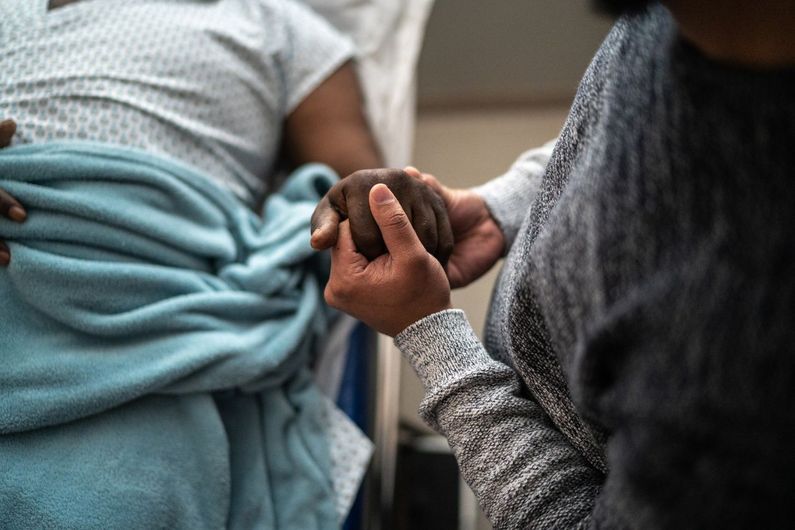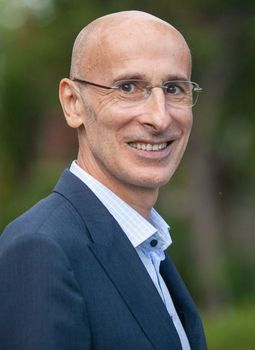New spiritual care internship now offered in Lausanne
- UdeMNouvelles
09/04/2024
- Virginie Soffer
Over the summer, UdeM students learned about new practices and approaches in spiritual care during an intensive internship at Lausanne University Hospital in Switzerland.
In an UdeM first, six students in the Institute of Religious Studies' spirituality and health program this summer completed their clinical internship in spiritual care at Lausanne University Hospital (LUH) in Switzerland.
Organized by UdeM professor Jean-Marc Barreau, the one-month intensive training was made possible by a grant from UdeM international, under its international activities funding program.
On site, the internship was supervised by Quebec-born Mario Drouin, a member of the LUH spiritual care team. Drawing on his wealth of experience and understanding of the different cultural and practice contexts in Switzerland and Quebec, Drouin guided each student in acquiring the essential skills needed to provide spiritual care.
It was a formative experience that exposed the students to new practices and approaches while immersing them in a culture different from their own.
The importance of spiritual assessment
Barreau believes in the importance of incorporating the concept of holistic care into the training of spiritual care practitioners (SCPs).
“When we consider patient health and well-being, we find that a patient’s distress can have a spiritual dimension,” he explained. “In that case, we try to help the patient overcome this spiritual distress to alleviate their overall distress.”
Barreau gave the example of morbid thinking that can feed feelings of guilt and calls for skilled intervention by an SCP. He cited patients who see their illness as divine punishment, a belief that can create additional spiritual distress.
To identify and address such misguided beliefs, the SCP conducts a spiritual assessment and then works with the patient to free them from this burden, which relieves both spiritual and other forms of distress.
“This is true for any patient, but even more so for those in palliative care,” Barreau noted.
He emphasized that this is a spiritual assessment, not a religious one. For him, the distinction is crucial for integrating spirituality into the interdisciplinary healthcare environment.
“If spirituality meant only religion, it would fall outside this interdisciplinary perspective; it would be denominational,” he explained.
“Distinguishing spirituality from religion allows every health professional—nurses, doctors, psychotherapists—to own this dimension and work with the SCP to provide comprehensive patient care.”
Role playing
Before meeting with patients, the students participated in four-hour simulations in which professional stage actors played the patient in a variety of scenarios. It was a valuable opportunity for the students to practice their skills in realistic situations.
After each simulation, the student’s performance was reviewed in detail by the supervisor and classmates. This critical feedback helped the students address issues such as transference, countertransference and spiritual abuse, and to improve their future interventions.
“The role-playing was sometimes unsettling for the students but proved extremely instructive,” said Barreau. “It allowed the students to practice in a safe environment before facing real-life situations and real patients. This limits the risk of making mistakes and gaffes in their future professional practice.”
New practices and approaches
At LUH, the students were introduced to a new spiritual assessment method called STIV, the French acronym for the four dimensions of spirituality: meaning, transcendence, identity and values. STIV is a holistic approach that looks at the patient’s spiritual beliefs and allows the SCP to understand how they shape the patient’s life.
“Ultimately, it’s about defining the patient’s spiritual identity so that it can inform our understanding of the patient’s relationship to their health and mortality,” explained Barreau. “STIV is unique in that it integrates these aspects in a coherent way and provides a comprehensive assessment of the patient’s spiritual situation.”
The differences between Switzerland and Quebec are not limited to the assessment models. Barreau pointed out that different words are used to describe the spiritual support process: intervention spirituelle (spiritual intervention) in Quebec, and accompagnement spirituel (spiritual accompaniment) in Switzerland.
This isn’t just a terminological difference: it reflects different ways of supporting the patient. In Quebec, spiritual support is often seen as a one-off intervention within a broader clinical context in which each professional steps in at a specific point in the patient’s care.
By contrast, in Lausanne, spiritual support is seen as an ongoing process in which the SCP accompanies the patient over time to provide long-term support in an evolving situation. According to Barreau, this approach stems from an underlying difference in the way spiritual care is perceived and integrated into the healthcare system.
Spirituality versus religion
Another major difference between the two cultures is the relationship between spirituality and religion. Barreau explained that in Quebec, spirituality tends to be dissociated from religion due to Quebec’s secular heritage. By contrast, in the Vaud region of Switzerland, where Lausanne is located, religion and spirituality coexist more easily without being conflated.
This difference has a direct impact on the way spiritual care is delivered, as patients have different expectations and needs depending on their personal spirituality and the societal context that shaped them.
Exposure to both Swiss and Quebec practices gave the students valuable perspective that will equip them to provide spiritual care better adapted to patients’ diverse needs.













